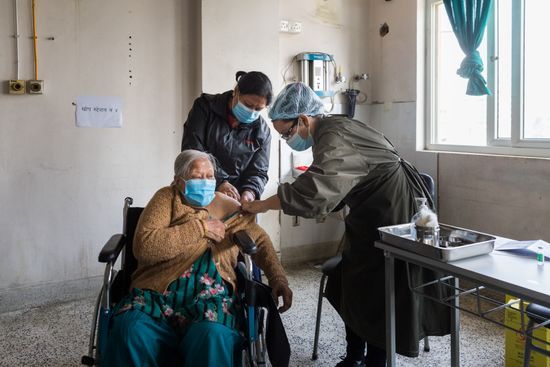
Health is a Human Right. Inaccessible and low-quality WASH services hinder the realization of this right for millions across the globe. This is especially true for women and girls, persons with disability, ethnic minorities and other marginalized groups. WASH barriers have a significant impact on quality of care in health-care facilities. This 2-hour course aligns with the updated WASH FIT and 8 practical steps to facilitate universal access to quality care.
This course has been developed by the WHO Regional Office for South-East Asia.
Photo credit: WHO / Blink media - Uma Bista
Langue: English
Health topic, Wash
Informations sur le cours
Course overview: In keeping with the commitment of Leaving No One Behind, WHO South-East Asia Region developed the “Toolkit on mainstreaming of gender equality, disability and social inclusion (GEDSI) in WASH in health-care facilities (2023)”. This toolkit is aligned with the WHO-UNICEF ‘Water, Sanitation and Hygiene in Health care facilities - Practical Steps to achieve universal access to quality care’ and provides detailed step-by-step guidance to integrate GEDSI in the ‘8 practical steps’ outlined in this document. The toolkit also reinforces integration of GEDSI priorities in the Water and Sanitation for Health Facility Improvement Tool (WASH FIT), which contributes to Step 4 of the 8 practical steps. This e-learning course is based on this toolkit and offers an opportunity for self-paced interactive learning on the issue.
Course duration: Approximately 2 hours.
Certificates: A Certificate of Achievement will be available to participants who score at least 80% of the total points in the final assessments. Participants who receive a Certificate of Achievement can also download an Open Badge for this course. Click here to learn how.
Ce que vous apprendrez
- describe the importance of GEDSI in WASH in health-care facilities
- describe how GEDSI can be integrated into the 8 practical steps to achieve universal access to quality care
À qui s'adresse ce cours
- National health and WASH sector actors who are leading the planning, development, and implementation of activities to strengthen WASH in health-care facilities
- WASH practitioners and health facility managers and staff who are taking steps to improve WASH in their health facilities
- Community leaders and representatives who want to ensure that the WASH infrastructure and services at their health facility meet the needs of all the community members across the life course
- Organizations that represent excluded and marginalized groups and are advocating for increased responsiveness of health facilities to the needs of their communities
Contenu du cours
Module 0: Introduction
Module 1: Equitable, inclusive WASH in health-care facilities:
By the end of this module, you will: list the benefits of equitable, inclusive WASH; identify groups marginalized in WASH in health-care facilities; and recognize how GEDSI can be integrated into the 8 practical steps to achieve universal access to quality of care.Module 2: Integrating GEDSI into policy on WASH in health-care facilities:
By the end of this module, you will: identify priority actions at the national level for GEDSI integration (steps 1-3 of the 8 practical steps); identify key stakeholders who can support the creation of an enabling environment for GEDSI in WASH in health-care facilities; list key considerations that can assist in integrating GEDSI in planning and programming; and identify standards for inclusive WASH in health-care facilities.Module 3: Supporting the practice of GEDSI integration and participation of excluded groups:
By the end of this module, you will: describe ways to make facility-level infrastructure more inclusive (steps 4, 6 and 7 of the 8 practical steps); recognize how integrating GEDSI into existing workforce training can ensure sustainability; and explain how communities can play a key role in advocacy for GEDSI.Module 4: Monitoring and continuous improvement:
By the end of this module, you will: explain how monitoring and review are essential for ensuring inclusive WASH in health-care facilities (steps 5 and 8); and describe the steps to conducting an operational research.Module 5: Resources:
By the end of this module, you will: understand the purpose and organization of the WHO “Toolkit on mainstreaming of gender equality, disability and social inclusion (GEDSI) in WASH in health-care facilities (2023)”; and identify and locate the other resources available on the subject.
Inscrivez-moi à ce cours
Certificate Requirements
- Obtenez un certificat de réussite en gagnant plus de 80% du nombre maximal de points pour la somme de toutes les tâches hebdomadaires.
- Obtenez un Open Badge en complétant le cours.